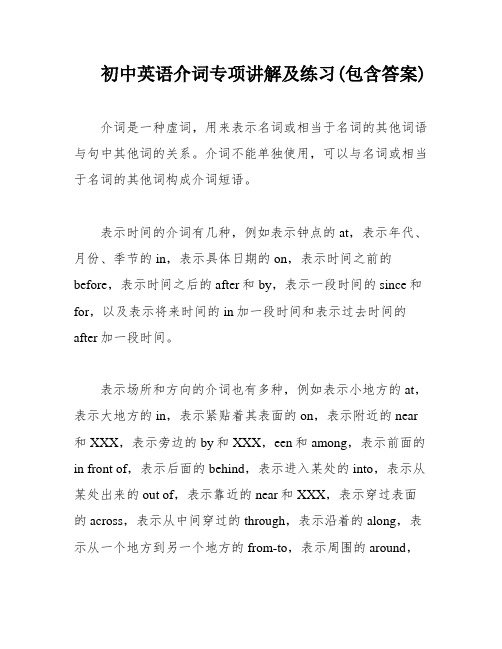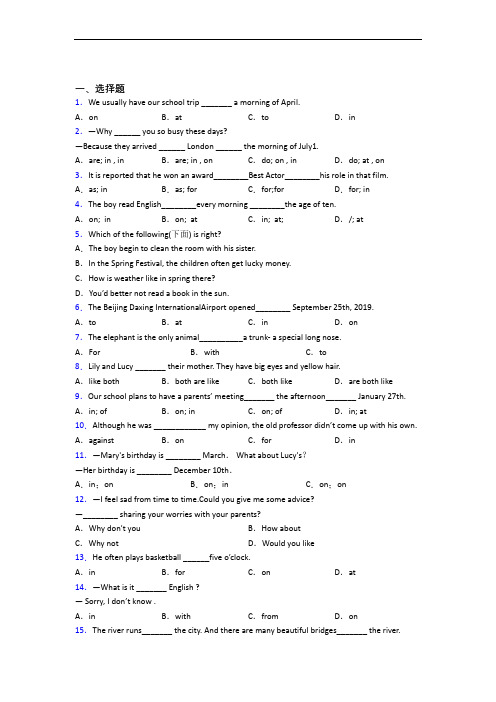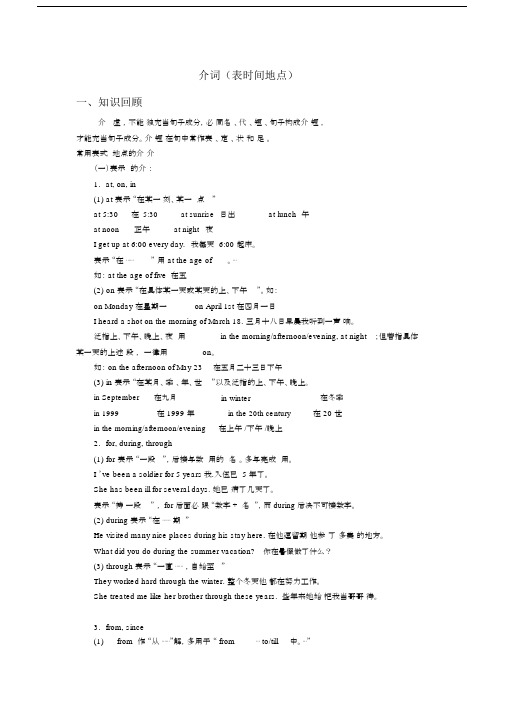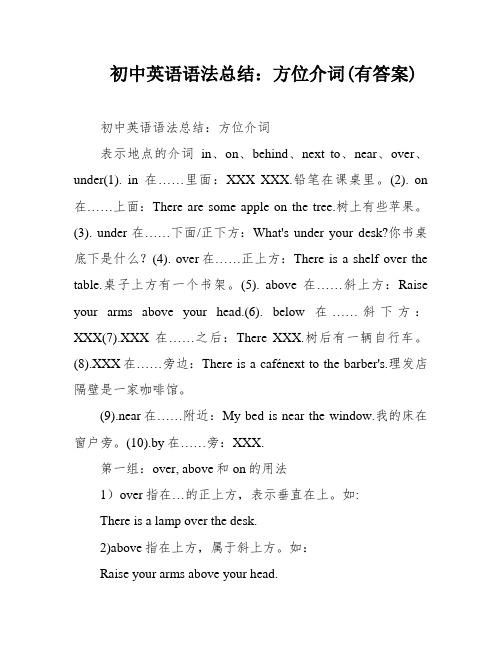初中英语语法知识—介词的图文答案
初中英语介词专项讲解及练习(包含答案)

初中英语介词专项讲解及练习(包含答案)介词是一种虚词,用来表示名词或相当于名词的其他词语与句中其他词的关系。
介词不能单独使用,可以与名词或相当于名词的其他词构成介词短语。
表示时间的介词有几种,例如表示钟点的at,表示年代、月份、季节的in,表示具体日期的on,表示时间之前的before,表示时间之后的after和by,表示一段时间的since和for,以及表示将来时间的in加一段时间和表示过去时间的after加一段时间。
表示场所和方向的介词也有多种,例如表示小地方的at,表示大地方的in,表示紧贴着其表面的on,表示附近的near和XXX,表示旁边的by和XXX,een和among,表示前面的in front of,表示后面的behind,表示进入某处的into,表示从某处出来的out of,表示靠近的near和XXX,表示穿过表面的across,表示从中间穿过的through,表示沿着的along,表示从一个地方到另一个地方的from-to,表示周围的around,表示正上方的over,表示正下方的under,表示斜上方的above,表示斜下方的below。
介词的使用需要根据具体情况来判断,掌握介词的用法可以帮助我们更准确地表达自己的意思。
In using a language。
it'XXX to know about the culture and customs of the people you are XXX my experience。
as someone who has lived in different countries。
it's important to adapt and be respectful。
just like you would in your own country.With the right clothing and knowledge。
you can XXX。
新初中英语语法知识—介词的图文答案

一、选择题1.We usually have our school trip _______ a morning of April.A.on B.at C.to D.in2.—Why ______ you so busy these days?—Because they arrived ______ London ______ the morning of July1.A.are; in , in B.are; in , on C.do; on , in D.do; at , on3.It is reported that he won an award________Best Actor________his role in that film. A.as; in B.as; for C.for;for D.for; in4.The boy read English________every morning ________the age of ten.A.on; in B.on; at C.in; at; D./; at5.Which of the following(下面) is right?A.The boy begin to clean the room with his sister.B.In the Spring Festival, the children often get lucky money.C.How is weather like in spring there?D.You’d better not read a book in the sun.6.The Beijing Daxing InternationalAirport opened________ September 25th, 2019.A.to B.at C.in D.on7.The elephant is the only animal__________a trunk- a special long nose.A.For B.with C.to8.Lily and Lucy _______ their mother. They have big eyes and yellow hair.A.like both B.both are like C.both like D.are both like 9.Our school plans to have a parents’ meeting_______ the afternoon_______ January 27th. A.in; of B.on; in C.on; of D.in; at 10.Although he was ____________ my opinion, the old professor didn’t come up with his own. A.against B.on C.for D.in11.—Mary's birthday is ________ March. What about Lucy's?—Her birthday is ________ December 10th.A.in;on B.on;in C.on;on12.—I feel sad from time to time.Could you give me some advice?—________ sharing your worries with your parents?A.Why don't you B.How aboutC.Why not D.Would you like13.He often plays basketball ______five o’clock.A.in B.for C.on D.at14.—What is it _______ English ?—Sorry, I don’t know .A.in B.with C.from D.on15.The river runs_______ the city. And there are many beautiful bridges_______ the river.A.across; through B.through; overC.through; through D.across; over16.My teacher runs ______ the morning. But he doesn't run ______ Sunday morning. A.in;on B.on;in C.in;in D.on;on 17.The Dragon Boat Festival fell ________June 18th this year.A.in B.to C.on D.from 18.(2017年山东德州)A woman stood ______ the window, watching the children playing games in the garden.A.past B.through C.across D.by19.This pair of jeans looks nice _____ Sandy, because she looks very nice _____ blue. A.on; in B.in; on C.for; on D.to; in 20.Nature has given us the ability to learn________watching others. Children do it naturally. A.by B.in C.on21.After working her way around the world, Annie ended up English as a foreign language. A.teach B.taughtC.teaching D.to teach22.—What's the weather _______ in Spring?—Pardon?(什么,请再说一遍)—How is the weather________in Spring?A.like;/ B./;like C.be like;/ D./;be like 23.—Hi, Jane. What time do you get up __________ weekdays?—I usually get up __________ about six o’cloc k.A.in; at B.on; at C.at; at D.on; on 24.—What are these ________ English?—These are egg-cups.A.at B.to C.on D.in 25.—When is your birthday party?—It's________.A.at six,on May 24th B.on six,this SaturdayC.in six o'clock this afternoon D.on six,at May 24th【参考答案】***试卷处理标记,请不要删除一、选择题1.A解析:A【解析】试题分析:句意:我们通常在四月份的早上郊游。
(完整word版)初中介词(表时间地点介词)讲解练习及答案.doc

介词(表时间地点)一、知识回顾介虚,不能独充当句子成分,必同名、代、短、句子构成介短,才能充当句子成分。
介短在句中常作表、定、状和足。
常用表式地点的介介(一)表示的介:1. at, on, in(1)at 表示“在某一刻、某一点”at 5:30 在5:30 at sunrise 日出at lunch 午at noon 正午at night 夜I get up at 6:00 every day.我每天6:00起床。
表示“在⋯⋯” 用at the age of。
⋯如: at the age of five 在五(2)on 表示“在具体某一天或某天的上、下午”。
如:on Monday 在星期一on April 1st 在四月一日I heard a shot on the morning of March 18. 三月十八日早晨我听到一声响。
泛指上、下午、晚上、夜用in the morning/afternoon/evening, at night;但若指具体某一天的上述段,一律用on。
如: on the afternoon of May 23在五月二十三日下午(3)in 表示“在某月、季、年、世”以及泛指的上、下午、晚上。
in September 在九月in winter 在冬季in 1999 在 1999 年in the 20th century 在 20 世in the morning/afternoon/evening 在上午 /下午 /晚上2. for, during, through(1)for 表示“一段”,后接与数用的名。
多与完成用。
I ’ve been a soldier for 5 years我.入伍已 5 年了。
She has been ill for several days. 她已病了几天了。
表示“持一段” , for 后面必跟“数字 +名”,而 during 后决不可接数字。
12 介词in,on,at 全国通用版(含答案)

语法——介词in on atPart 1:知识点一、介词:是一种虚词,在句子中表示名词或代词与其他词之间的关系,不能单独做为句子成分,常位于名词或代词前面构成介词短语。
二、具体用法:常用介词1.in(1)表示方位:在……里面例句:There are three books in my bag.我书包里有三本书。
(2)表示地点:A.表示在大地方例句:I live in Hangzhou.我住在杭州。
B.表示属于该范围例句:Hei Longji ang lies in the north of China.黑龙江在中国北部。
(3)表示时间:A.表示一段时间(比较长)例:in summer在夏天in 2021在2021年in February 在二月B.表示在早上、下午、晚上例:in the morning/afternoon/evening(4)表示使用某种材料、语言等:例句:I can sing the song in English.我能用英语唱这首歌。
2.on(1)表示地点:在……上面例句:There is an apple on the desk.桌子上有一本书。
(2)表示时间:A.表示在具体某一天的上午、下午或晚上例:on June thirteenth在六月13日on the morning of May 1st在五月一日的早上B.表示在星期几的上午、下午或晚上例:on Friday在周五on Saturday afternoon在周六的下午2.at(1)表示在小地点:例:at school /home(2)表示时间点:例:at seven在七点at night在夜晚Part 2:练习一、用介词填空。
1.My mother begins to work ______ 8:00 ______ t he morning.2.Do you stay ______ home ______ weekend?3.They live ______ a new house now.4.Xinjiang is ______ the west of China.5.Lily usually have breakfast ______ the morning.6.They often have lunch ______ half past twelve.7.What’s this ______ English?8.There is a big gym ______ my school.9.She came to this city ______ 2020.10.It often snows here ______ winter.11.I will be back ______ a month.12.Don’t watch TV too much ______ the evening.13.Sally was born ______ May 11th.14.We don’t go to school ______ Saturday and S unday.15.They were happy ______ that time.16.______ the age of ten, I began to learn English.17.What do you often do ______ noon?18.______ a cold winter morning, I met her in the street.19.Mrs. Green came to Beijing ______ 2005.20.Children wake up very early ______ the morning ofChristmas Day.答案:1.at in2.at on3.in4.in5.in6.at7.in8.in9.in 10.i n 11.in 12.in 13.on 14.on 15.at 16.At 17.at 18.On 19.in 20.on。
新初中英语语法知识—介词的图文答案(2)

一、选择题1.— What kind of home do you ? — A flat three bedrooms.A.live in; with B.live; with C.live in; has D.live; has2.The boy read English________every morning ________the age of ten.A.on; in B.on; at C.in; at; D./; at3.—There is a hole in the wall. What is it for?—We have a dog. He can get in or out ________ it.A.past B.through C.across D.over4.—What do you use the shelf ______?—I use it ______ books.A.to; to keep B.to; keepC.for; to keep D.for; keep5.The Beijing Daxing InternationalAirport opened________ September 25th, 2019.A.to B.at C.in D.on6.The girl often goes to the park many beautiful flowers.A.with B.have C.has D.in7.The elephant is the only animal__________a trunk- a special long nose.A.For B.with C.to8.Alth ough he was ____________ my opinion, the old professor didn’t come up with his own. A.against B.on C.for D.in9.Lily often goes to visit her grandma ______ Sundays.A.at B.in C.on D.to10.She is talented ________ music but I am good at sports.A.at B.in C.on11.Taiwan is __________ the southeast of China and Hunan is __________ the south of Hubei. A.in;in B.in;on C.on;in D.on;to 12.—Why ______ you so busy these days?—Because they arrived ______ London ______ the morning of July1.A.are; in , in B.are; in , on C.do; on , in D.do; at , on 13.The Qingming Festival of this year falls _____ April 5th and thousands of cars poured into high-ways _____ the early morning of the holiday.A.on; in B.in; on C.on; on D.in; in14.The next Olympic Games will be held in Japan________ 27th July 2020.A.on B.in C.at D.of15.---What’s your hobby ? ---______collecting balls, I also like different kinds of CDs. A.Besides B.Except C.Beside D.About 16.There is an old bridge __________the river. Be careful (小心) when you ________________ it.A.over; across B.over; cross C.on; cross D.on; across 17.—How long have you lived in this town?—________2001.A.since B.in. C.for18.Look! The girl ________ green clothes is my sister and the boy ________ big eyes is my brother.A.in; has B.in a; has a C.in; with D.in a; with a 19.The river runs_______ the city. And there are many beautiful bridges_______ the river. A.across; through B.through; overC.through; through D.across; over20.He often has lunch ______ about twelve o'clock.A.in B.at C.on D.with21.Tom and Black clothes store is ______a great sale. It has nice shirts _______all colors. A.at; in B.on; at C.of; in22.There________ a hamburger and bananas________there.A.is;in B.are;in C.is;/ D.are;/23.I have to prepare ________my math test________ Friday afternoon.A.at; on B.for; on C.on ;for24.(2017年安徽) To my pleasure, my family is always _____ me whatever I decide to do. A.above B.behind C.from D.through25.Jenny’s math lesson is________nine________Friday morning.A.in; on B.at; on C.on; in D.at; in【参考答案】***试卷处理标记,请不要删除一、选择题1.A解析:A【解析】【详解】句意:-你喜欢住在什么样的家里?-一个带三个卧室的公寓。
初中英语语法总结:方位介词(有答案)

初中英语语法总结:方位介词(有答案)初中英语语法总结:方位介词表示地点的介词in、on、behind、next to、near、over、under(1). in在……里面:XXX XXX.铅笔在课桌里。
(2). on 在……上面:There are some apple on the tree.树上有些苹果。
(3). under在……下面/正下方:What's under your desk?你书桌底下是什么?(4). over在……正上方:There is a shelf over the table.桌子上方有一个书架。
(5). above在……斜上方:Raise your arms above your head.(6). below在……斜下方:XXX(7).XXX在……之后:There XXX.树后有一辆自行车。
(8).XXX在……旁边:There is a cafénext to the barber's.理发店隔壁是一家咖啡馆。
(9).near在……附近:My bed is near the window.我的床在窗户旁。
(10).by在……旁:XXX.第一组:over, above和on的用法1)over指在…的正上方,表示垂直在上。
如:There is a lamp over the desk.2)above指在上方,属于斜上方。
如:Raise your arms above your head.3)on指在上面,表示两物体接触。
如:There is a cup on the table.第二组:under / below的用法:1) under在……上面/正下方:What's under your desk?2) below在……斜下方:XXX.操演:() 1 The boat is passing___ the bridge.A. XXX() 2 Two planes are flying___ the city.A. XXX, below() 3 We can see a river running to the east____ the XXX() 4 Do you see the kite ___ the building.A. XXX参考谜底C B B D第三组:in和on透露表现“在……上”门一类——镶嵌在墙里的,用in书画一类——挂在墙面上的,用on() 1 He put up a map ___ the back wall because there was a hole ___ it.A. on; onB. at; inC. on; inD. on; at() 2 There is a door___ the wall.A. XXX() 3 Any man ___ eyes______ his head can see that he'XXX.A. with; onB. with; inC. on; withD. in; with鸟一类落在树上的,用in;XXX一类长在树上的,用on() 1 There are some birds singing___ the trees.A. XXX() 2 There are so many apples___ that tree.A. inB, XXX第四组:XXX表示“接壤”第四组:XXX表示“接壤”BABAB在A里——用inA和B相邻(接壤)——用onABA和B不相邻(不接壤)——用to练() 1 The United States is ____ the south of Canada and ___ the east of Japan.A. to; inB. on; toC. in; besideD. at; on() 2 The man stood ____the window, XXX() 3 Japan lies____ the east of China.A. XXX参考答案B B B B第五组:at, in表示“在……”1)at透露表现较小的地址。
(完整版)方位介词---附习题及参考答案
年月周前要用in,日子前面却不行。
遇到几号要用on,上午下午又是in。
要说某日上下午,用on换in才能行。
午夜黄昏须用at,黎明用它也不错。
at也用在明分前,说“差”可要用上to。
说“过”只可使用past,多说多练牢牢记。
【知识梳理】一、介词(prep.)含义:表示它后面的名词或代词与其他句子成分的关系。
介词分类:时间介词;方位介词;方式介词介词短语:介词+名词; 动词+介词;be +形容词+介词二、表示方位的介词:1.in, to, on(1)in表示在某一地区之内的某方位(属于该范围);Fujian is in the southeast of China.(2)to表示在某一地区之外的某方位(不属于该范围);Japan is to the east of China(3)on表示与某地的毗邻关系Korea is on the east of China.2.over,above和on(1)over 指在......正上方,表垂直在上。
There is a bridge over the river.(2)above 指在上方,属于斜上方。
Raise your arms above your head(3)on指在上面,表两物体接触。
There is a plate on the table.3.at,in和on的用法区别(1)at 表示较小的地方。
at the bus stop, at home(2)in 表示较大的地方。
in China, in the world(3)on 表示在一个平面上。
on the table4.(1) in front of在......之前(范围外)。
There are some trees in front of the classroom(2) in the front of表示“在......的前部”(范围内)Our teacher usually sits in the front of the classroom.(3)before所表示的位置关系和in front of 通用,表示“在......前”,“在......面前”5.below,under(1)below表示“在下方或位置低于......”,不一定有垂直在下之意;(2) under表示“在......正下方”。
介词in,on,at及其练习附答案(解析版)
介词in,on,at及其练习附答案(解析版)介词in、on和at在表示时间的名词前的使用有所不同。
具体区别如下:一、使用in的情况:1.表示“在某年/月/季节”时,需要使用介词in。
例如:她于1980年来到这个城市。
夏天这里经常下雨。
2.表示“从现在起一段时间以后”时,需要使用介词in。
例如:他们将在一周后去看望你。
我将在一个月后回来。
3.表示“在某个世纪”时,需要使用介词in。
例如:这台机器是在18世纪发明的。
20世纪发生了巨大变化。
4.表示“在某个年代或特定世纪某个年代”时,需要使用介词in。
例如:该事件发生在20世纪70年代。
抗日战争爆发于20世纪30年代。
5.除此之外,morning、evening和afternoon三个词也常与介词in连用。
例如:晚上看电视不要太多。
他们有时在下午做游戏。
二、使用on的情况:1.表示“在具体的某一天”或“(在具体的某一天的)早上、中午、晚上”等,需要使用介词on。
例如:杰克生于1982年5月10日。
他们是在一个雨天的早上离开的。
他于一个夏天的下午返回了美国。
2) 表示星期几或其时间,需使用介词on。
例如:我们星期六和星期天不上学。
平日你几点起床?我是在星期六的早晨听到这个故事的。
3) 表示某个节日,需使用介词on。
例如:我们通常在中秋节吃月饼。
胡老师在教师节那天收到了一张卡片。
1) 表示具体时间点,需使用介词at。
例如:他每天六点起床。
昨天下午五点半我到家了。
2) 表示特定的时节或时机,需使用介词at。
例如:他们那时很幸福。
我认为商店在白天的这个时候关门了。
3) 表示中午、夜晚或周末,需使用介词at。
例如:你中午经常做些什么?夜晚你能看到天空中有许多星星。
4) 表示某个年龄,需使用介词at。
例如:这个男孩在九岁的时候就游泳游得很好了。
When I was twenty years old。
I started teaching English at a school。
语法知识—介词的图文答案
一、选择题1.There is a computer _______ the desk.A.on B.in C.under D.for2.—Do you know the girl ________ red skirts?—Yes, she is my sister.A.at B.on C.in D.to3.______ Sunday morning my sister usually does her homework, and ______ the afternoon she usually plays tennis.A.On; on B.In; in C.On; in D.In; on4.The Qingming Festival of this year falls _____ April 5th and thousands of cars poured into high-ways _____ the early morning of the holiday.A.on; in B.in; on C.on; on D.in; in5.---What’s your hobby ? ---______collecting balls, I also like different kinds of CDs. A.Besides B.Except C.Beside D.About6.We have four lessons ________ the morning.A.in B.on C.at D.for7.-What are they talking ________?-I am not sure. Because they are talking ______English, I don't know English .A.to; with B.to; inC.with; about D.about; in8.Look! The girl ________ green clothes is my sister and the boy ________ big eyes is my brother.A.in; has B.in a; has a C.in; with D.in a; with a 9.The river runs_______ the city. And there are many beautiful bridges_______ the river. A.across; through B.through; overC.through; through D.across; over10.—Where is Tom?—He is playing football ___________ the playground.A.of B.to C.on D.from11.My teacher runs ______ the morning. But he doesn't run ______ Sunday morning.A.in;on B.on;in C.in;in D.on;on 12.—What do you think your life will________next year?—My life will be________better than it is now.A.be like; very B.be like; a lot C.be; a lot13.--Which is your teacher?--The one thick(厚厚的)glasses over his eyes is.A.wears B.wear C.with D.has14.I want to learn English well because I don’t want to talk with foreigners ________ anybodyA.by B.through C.across D.at15.— Hey, Nancy. What do you usually do ________ rainy days? — I usually listen to music. A.in B.on C.at D.to16.Bill doesn't like playing football,but he often watches football matches (比赛)_____ TV. A.in B.on C.to D.with17.It is not easy to cross the river ________ a ropeway.A.from B.with C.by D.on18.My friend, Henry was born June 10th, 1997.A.in B.on C.at D.for19.If success is a gate, the road this gate must be made up of difficulties.A.towards B.against C.opposite D.beyond 20.They got married_______ 1960. That means they have been married _______ 1960. A.at; since B.on; in C.in; since D.for; since 21.—Where is Hubei?—It’s _______ the north of Hunan.A.in B.to C.on22.—What are these ________ English?—These are egg-cups.A.at B.to C.on D.in23.We started out in early spring and headed west the northern part of Asia. A.through B.between C.among D.across 24.Don’t leave the room _____ the light on .A.in B.on C.about D.with 25.—What is Linda doing?—She is talking ________ the phone with her friend ________ a movie.A.in; for B.on; on C.about; on D.on; about【参考答案】***试卷处理标记,请不要删除一、选择题1.A解析:A【解析】试题分析:句意:在书桌上有一台电脑。
初中英语语法:介词(共28张)
behind/in front of/in the front LOGO
of
behind 在...之后
There is a broom behind the door.
broom n.扫把
behind/in front of/in the front of
LOGO
couple n.夫妇
The couple are standing in front of the car. 在(外部)...前面
There isn’t a cloud in the sky.
What’s in the box? He put his hands in his pockets.
in/at
station n.车站. stop n.车站
LOGO
in+大地点 at+小地点
I will wait for you at the station. I am staying in China. at home at the bus stop in the world在世界上
五 介词 Preposition /prep.
介词 表示名词,代词和句中其他词之间关系的词
主要表示地点、位置、时间和方式等
What can you see in the picture? I was born on May 11th. The library is near the post office.
The baby and I were in the front of the car. 在(内部)...前面
between
boundary n.界限
LOGO
between 在...之间
My bedroom is between mytwo sisters’.
- 1、下载文档前请自行甄别文档内容的完整性,平台不提供额外的编辑、内容补充、找答案等附加服务。
- 2、"仅部分预览"的文档,不可在线预览部分如存在完整性等问题,可反馈申请退款(可完整预览的文档不适用该条件!)。
- 3、如文档侵犯您的权益,请联系客服反馈,我们会尽快为您处理(人工客服工作时间:9:00-18:30)。
一、选择题1.---What’s your hobby ? ---______collecting balls, I also like different kinds of CDs. A.Besides B.Except C.Beside D.About 2.It is reported that he won an award________Best Actor________his role in that film. A.as; in B.as; for C.for;for D.for; in 3.The boy read English________every morning ________the age of ten.A.on; in B.on; at C.in; at; D./; at 4.—What do you use the shelf ______?—I use it ______ books.A.to; to keep B.to; keepC.for; to keep D.for; keep5.Which of the following(下面) is right?A.The boy begin to clean the room with his sister.B.In the Spring Festival, the children often get lucky money.C.How is weather like in spring there?D.You’d better not read a book in the sun.6.—Do you know the girl ________ red skirts?—Yes, she is my sister.A.at B.on C.in D.to 7.—What do you think of happiness, Zoe?—I think happiness is a way station too much and too little.A.among B.between C.opposite D.beyond 8.The elephant is the only animal__________a trunk- a special long nose.A.For B.with C.to9.—Mary's birthday is ________ March. What about Lucy's?—Her birthday is ________ December 10th.A.in;on B.on;in C.on;on10.My uncle has taught in this school________ he was twenty years old.A.after B.for C.until D.since 11.Taiwan is _________ the southeast of China.A.to B.in C.from D.on 12.—I feel sad from time to time.Could you give me some advice?—________ sharing your worries with your parents?A.Why don't you B.How aboutC.Why not D.Would you like13.Thanks ______your family photos, they are very nice.A.to B.in C.for D.at 14.Can you jiaozi English?A.say;with B.speak;in C.say;in D.tell;about15.We have four lessons ________ the morning.A.in B.on C.at D.for16.I can’t go out ________ school nights because I have to fi nish my homework first.A.at B.in C.on17.Jim and Tim are talking _______ the phone.A.at B.on C.with D.in18.My teacher runs ______ the morning. But he doesn't run ______ Sunday morning. A.in;on B.on;in C.in;in D.on;on 19.—What is Linda doing?—She is talking ________ the phone with her friend ________ a movie.A.in; for B.on; on C.about; on D.on; about 20.There is a computer _______ the desk.A.on B.in C.under D.for21.It’s very kind ___________ you to lend me your reusable shopping bags.A.of B.for C.to D.with22.There________ a hamburger and bananas________there.A.is;in B.are;in C.is;/ D.are;/23.They got married_______ 1960. That means they have been married _______ 1960. A.at; since B.on; in C.in; since D.for; since24.He has a garden __________ a lot of flowers.A.has B.there is C.with25.The Qingming Festival of this year falls _____ April 5th and thousands of cars poured into high-ways _____ the early morning of the holiday.A.on; in B.in; on C.on; on D.in; in【参考答案】***试卷处理标记,请不要删除一、选择题1.A解析:A【解析】【详解】句意:---你的爱好是什么?---除了收集球以外,我也喜欢各种各样的CD。
本题主要考查介词词义辨析。
A. Besides意为“除……之外(还有)”;B. Except “除……之外(不再有)”;C. Beside“除……之外(表示排斥)”;D. About大约。
根据 also可知,收集球也是我的兴趣爱好,包含关系,故选A。
2.C解析:C【解析】【详解】句意:据报道,他因在那部电影中的角色而获得最佳男演员奖。
考查介词。
第一空,根据空后Best Actor可知,此空是“表示对象、用途等” 关于的意思,应填介词for,故排除A和B;第二空,根据空后his role in that film.可知,此空是“因为,由于”的意思,此空应填连词for,故排除D,故选C。
3.D解析:D【解析】【详解】句意:那男孩十岁时每天早晨读英语。
考查介词辨析。
on 在……后加星期几,节日前,具体的日期;in 在……;后加一天中的上午,下午或晚上;加月份,年,季节等;at加具体的时间点,或固定搭配。
every morning 每天早上,前面不加介词;短语at the the age of…表示“在某人多大岁的时候” at the age of ten表示“在10岁的时候”。
根据题意,故选D。
4.C解析:C【解析】【详解】句意:——你使用那个架子干什么?——我用它来保存书籍。
考查介词用法和不定式作宾语补足语。
to表示目的或意图;keep保存;for为了。
分析句子结构可知要用介词for与疑问句what搭配表示“为了什么”,to后需接动词原形构成不定式,不符合题意;use sth. to do sth.用某物来做某事,第二空用动词不定式表目的。
故选C。
5.D解析:D【解析】【详解】句意:下面那一项是正确的?考查判断句子正误。
A项中主语“The boy”是第三人称单数,谓语动词要用第三人称单数形式begins;B项中由“the children often get lucky money”可知,这里的孩子们不用特指。
而不用the;C项中weather特指“那个地方春季的天气”,其前要用定冠词the,且用How提问时其后不用like;D项你最好不要在阳光下看书。
had better +do最好做某事,在阳光下in the sun正确。
故选D。
6.C解析:C【分析】【详解】句意:——你知道穿红裙子的那个女孩吗?——是的,她是我的妹妹。
考查介词辨析。
at在……;on在……上;in穿,在……; to到……。
根据下文“Yes, she is my sister.”可知上文是“穿红裙子的那个女孩”,in red skirts表示“介词短语作后置定语”。
the girl in red skirts表示“穿红衣服的那个女孩”,根据题意,故选C。
7.B解析:B【解析】【分析】【详解】句意:——Zoe,你怎样看待幸福?——我认为幸福是介于太多和太少之间的一个中转站。
考查介词辨析。
A. among在…中间,指三者或三者以上的中间;B. between在…之间,在两者之间;C. opposite在…的对面;D. beyond超过、超越。
根据I think happiness is a way station too much and too little.可知句意为“我认为幸福是介于太多和太少之间的一个中转站。
”由后面的too much and too little,可知是介于两者之间,所以应用between,故答案选B。
8.B解析:B【解析】【分析】【详解】句意:大象是唯一有象鼻的动物——一个特殊的长鼻子。
考查介词辨析。
For给,因为;with带有,和;to向,到。
根据句意,可知空处是介词短语作后置定语用,修饰animal;结合选项,可知是with a trunk修饰空前animal,意为带有象鼻的动物。
故选B。
9.A解析:A【解析】【分析】【详解】句意:--Mary的生日在三月,Lucy的呢?—他的生日在10月10日。
